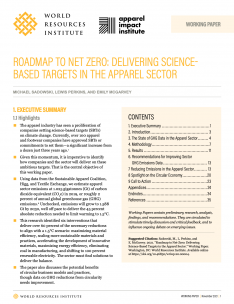
The apparel industry has seen a proliferation of companies setting and committing to science-based targets (SBTs) in recent years. Currently, over 100 companies have approved SBTs or commitments to set them – up from a dozen just three years ago. This roadmap from the WRI identifies how companies and the sector will deliver on these ambitious targets.
Using data from the Sustainable Apparel Coalition and Textile Exchange, the report estimated apparel sector emissions to be 1.025 gigatons CO2e in 2019, which could grow to 1.588 gigatons by 2030. It highlights six interventions to deliver emissions reductions to align with a 1.5°C global warming scenario. These are maximizing material efficiency, scaling sustainable materials and practices, accelerating the development of innovative materials, proliferating energy efficiency, eliminating coal in manufacturing, and shifting to 100% renewable electricity.
The apparel industry needs to shift from a linear to circular economy model to reduce the negative environmental impacts it is currently having.
